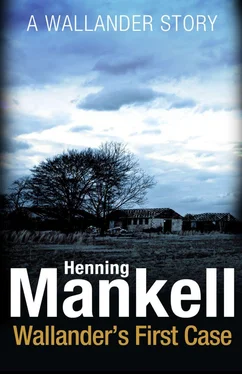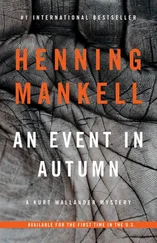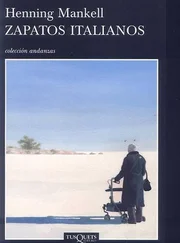Henning Mankell - Wallander's First Case
Здесь есть возможность читать онлайн «Henning Mankell - Wallander's First Case» весь текст электронной книги совершенно бесплатно (целиком полную версию без сокращений). В некоторых случаях можно слушать аудио, скачать через торрент в формате fb2 и присутствует краткое содержание. Год выпуска: 0101, ISBN: 0101, Издательство: Random House, Жанр: Полицейский детектив, на английском языке. Описание произведения, (предисловие) а так же отзывы посетителей доступны на портале библиотеки ЛибКат.
- Название:Wallander's First Case
- Автор:
- Издательство:Random House
- Жанр:
- Год:0101
- ISBN:9781473520721
- Рейтинг книги:4 / 5. Голосов: 1
-
Избранное:Добавить в избранное
- Отзывы:
-
Ваша оценка:
- 80
- 1
- 2
- 3
- 4
- 5
Wallander's First Case: краткое содержание, описание и аннотация
Предлагаем к чтению аннотацию, описание, краткое содержание или предисловие (зависит от того, что написал сам автор книги «Wallander's First Case»). Если вы не нашли необходимую информацию о книге — напишите в комментариях, мы постараемся отыскать её.
Wallander's First Case — читать онлайн бесплатно полную книгу (весь текст) целиком
Ниже представлен текст книги, разбитый по страницам. Система сохранения места последней прочитанной страницы, позволяет с удобством читать онлайн бесплатно книгу «Wallander's First Case», без необходимости каждый раз заново искать на чём Вы остановились. Поставьте закладку, и сможете в любой момент перейти на страницу, на которой закончили чтение.
Интервал:
Закладка:
‘Let me check,’ the woman said.
This was wrong, Wallander realised. I react before I’ve thought my ideas through enough.
He wondered if he should just hang up. But the woman would wonder about that, think the call had been cut off, and might call for him at the station. He waited. It took a long time before she returned.
‘His death was just in the process of being recorded,’ she said. ‘That’s why it took a while. But you were right.’
Wallander sat up.
‘His name was Hansson before. He changed his name in 1962.’
Right, Wallander thought. But wrong anyway.
‘The first name,’ he said. ‘What was it?’
‘Anders.’
‘It should have been Artur.’
The answer came as a surprise.
‘It was. He must have had parents who loved names, or who couldn’t agree. His name was Anders Erik Artur Hansson.’
Wallander held his breath.
‘Thank you so much for your help.’
When the call was over, Wallander felt a strong urge to contact Hemberg. But he stayed where he was. The question was how much his discovery was worth. I’ll follow up on this myself, he decided. If it doesn’t lead anywhere, no one has to know about it.
Wallander pulled over his notepad and started to make a summary. What did he really know? Artur Halen had changed his name seven years ago. Linnea Almquist had said at some point that Halen had moved in at the start of the 1960s. That could fit.
Wallander ended up sitting with the pen in his hand. Then he called back the pastor’s office. The same woman answered.
‘I forgot to ask you something,’ Wallander excused himself. ‘I need to know when Halen moved to Rosengard.’
‘You mean Hansson,’ the woman said. ‘I’ll go see.’
This time she was much faster.
‘He is registered as newly moved on 1 January 1962.’
‘Where did he live before?’
‘I don’t know.’
‘I thought that information was available?’
‘He was registered as being out of the country. There is no information about where.’
Wallander nodded into the receiver.
‘Then I think that is all. I promise not to disturb you again.’
He returned to his notes. Hansson moves to Malmo from some unknown foreign location in 1962 and changes his name at the same time. A few years later he starts a relationship with a woman in Arlov. If they had known each other earlier, I don’t know. After several more years she is murdered and Halen commits suicide. It’s not clear in what order this occurs. But Halen kills himself. After first filling out a betting form and putting an extra lock on his door. And after swallowing a number of precious stones.
Wallander made a face. He still wasn’t finding a direction from which to proceed. Why does a person change his name? he thought. To make himself invisible? To make himself impossible to find? So that no one will know who he is or who he has been?
Who you are or who you have been?
Wallander thought about this. No one had known Halen. He had been a loner. There could, however, be people who had known a man by the name of Anders Hansson. The question was how he could find them.
At that moment he was reminded of something that had happened the preceding year that might help him find a solution. A fight had broken out between some drunks down by the ferry terminal. Wallander was one of the officers who responded to the dispatch and helped to break up the fight. One of the parties involved was a Danish sailor by the name of Holger Jespersen. Wallander had had the impression that he had unwillingly been dragged into the fight and said as much to his superiors. He had also insisted that Jespersen had not done anything and the man had been allowed to go free while the others were brought in. Later on Wallander had forgotten all about it.
But a few weeks later Jespersen had suddenly turned up outside his door in Rosengard and given him a bottle of Danish aquavit as thanks for his help. Wallander had never managed to establish how Jespersen had found him. But he had invited him in. Jespersen had problems with alcohol, but only from time to time. Usually he worked on various ships as an engineer. He was a good storyteller and seemed to know every northern sailor from the past fifty years. Jespersen had told him that he usually spent his evenings in a bar in Nyhavn. When he was sober he always drank coffee. Otherwise beer. But always in the same place. If he was not somewhere out at sea.
Now Wallander came to think of him. Jespersen knows, he thought. Or else he can give me some advice.
Wallander had already made his decision. If he was lucky, Jespersen would be in Copenhagen and hopefully not in the middle of one of his drinking binges. It was not yet three o’clock. Wallander would spend the rest of the day going to Copenhagen and back. No one seemed to miss his presence at the station. But before he set off across the sound he had a telephone call to make. It was as if his decision to go to Copenhagen had given him the necessary courage. He dialled the number to the hair salon where Mona worked.
The woman who answered the phone was called Karin and was the owner. Wallander had met her on several occasions. He found her intrusive and nosy. But Mona thought she was a good boss. He told her who he was and asked her to give a message to Mona.
‘You can talk to her yourself,’ Karin said. ‘I have a woman under a dryer here.’
‘I’m in a case meeting,’ Wallander said and tried to sound busy. ‘Just tell her that I’ll be in touch by ten o’clock tonight.’
Karin promised to forward the message.
Afterwards Wallander noticed that he had started sweating during the short conversation. But he was still happy that he had accomplished it.
Then he left the station and just managed to catch the hydrofoil that left at three o’clock. Earlier in the year he had often gone to Copenhagen. First alone, and then with Mona. He liked the city, which was so much bigger than Malmo. Sometimes he also went to Det Kongelige Theatre when there was an opera performance he wanted to see.
He didn’t much care for the hydrofoils. The trip went too fast. The old ferries gave him a stronger feeling that there was actually some distance between Sweden and Denmark; that he was travelling abroad when he crossed the sound. He looked out the window as he drank his coffee. One day they will probably build a bridge here, he thought. But I probably won’t have to live to see that day.
When Wallander arrived in Copenhagen it had started to drizzle again. The boat docked in Nyhavn. Jespersen had told him where his regular pub was and it was not without a feeling of excitement that Wallander stepped into the semi-darkness. It was a quarter to four. He looked around the dim interior. There were a few customers scattered about, sitting at tables, drinking beer.
A radio was turned on somewhere. Or was it a record player? A Danish woman’s voice was singing something that seemed very sentimental. Wallander didn’t see Jespersen at any of the tables. The bartender was working on a crossword puzzle in a newspaper spread out over the counter. He looked up when Wallander approached.
‘A beer,’ Wallander said.
The man gave him a Tuborg.
‘I’m looking for Jespersen,’ Wallander said.
‘Holger? He won’t be in for another hour or so.’
‘He’s not out at sea, then?’
The bartender smiled.
‘If he was, he would hardly be coming in in an hour, would he? He usually comes in around five.’
Wallander sat down at a table and waited. The sentimental female voice had now been replaced by an equally schmaltzy male voice. If Jespersen came in around five, Wallander would have no trouble being back in Malmo before he was set to call Mona. Now he tried to think out what he was going to say. He would not even acknowledge the slap. He would tell her why he had contacted Helena. He would not give up until she believed what he said.
Читать дальшеИнтервал:
Закладка:
Похожие книги на «Wallander's First Case»
Представляем Вашему вниманию похожие книги на «Wallander's First Case» списком для выбора. Мы отобрали схожую по названию и смыслу литературу в надежде предоставить читателям больше вариантов отыскать новые, интересные, ещё непрочитанные произведения.
Обсуждение, отзывы о книге «Wallander's First Case» и просто собственные мнения читателей. Оставьте ваши комментарии, напишите, что Вы думаете о произведении, его смысле или главных героях. Укажите что конкретно понравилось, а что нет, и почему Вы так считаете.












